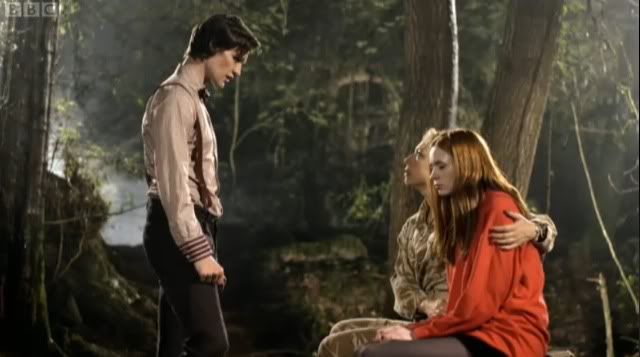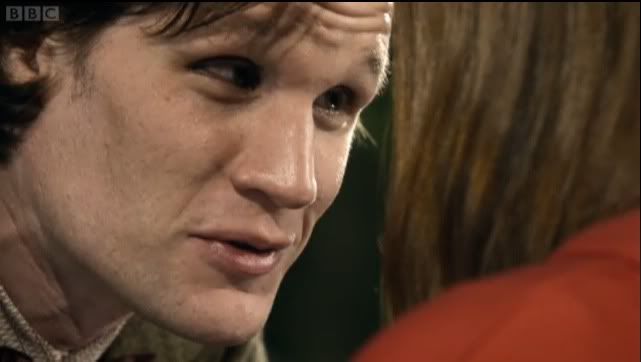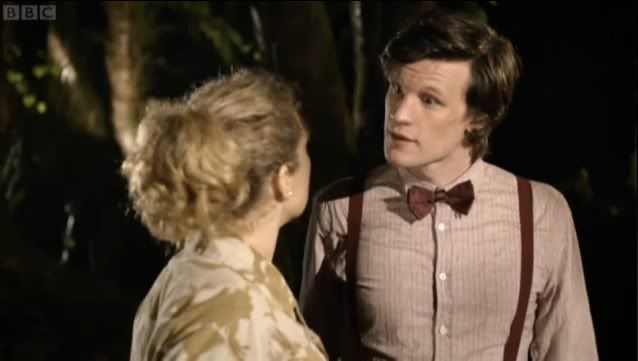And then there was the end... Amy throws herself at the Doctor. Simultaneously a real WTF moment but also very funny, and, really, if she's going to want a sympathy fuck from him she's really got no business marrying Rory.
I think that "The Eleventh Hour" made it clear from the start that Amy did not have her feelings about the men in her life fully sorted out and that she's making a mistake (at least at this juncture) in marrying Rory.
It really felt, more than anything, like ripping the piss out of Saint Rose, and demonstrating that the showrunner made his name in sitcoms.
... what, exactly, about the Doctor/Amy relationship makes you think it has anything whatsoever to do with Rose? Why do you think it's "ripping the piss out of Saint Rose?" Especially since it's not like Steven Moffat hasn't done Doctor/Rose, or paired the Doctor off with other Human girls before (Reinette, River Song).
Yeah, Amy throwing herself at the Doctor was completely out of character.
Are you watching the same character I am? This is the same girl who refused to turn away from the naked man while her boyfriend was standing right next to her, after all, and the same girl who's been fixated on the Doctor all her life. There's nothing out of character about her wanting to have sex with the Doctor.
There was nothing romantic about what she wanted during that final scene.
It depends on how you interpret her line about not wanting anything so permanent as a marriage. That could mean she just wants sex, but it could also mean she just doesn't want to make any plans beyond the immediate future.
You know, I think actually seeing the Angels move was a lot creepier than it should have been.
Agreed! I think it was the sound effect they inserted that made it much creepier than it would have been otherwise.
Gotta love Moffat's approach to a season long arc whereby the Doctor actually notices it before we even reach the midway point, and also Moffat's approach to a companion having feelings for the Doctor; none of RTD's pussy footing around simpering twu wuve,
Where did anyone ever use the phrase "true love" in RTD Who? I remember Rose telling the Doctor she loved him at the end of "Doomsday," and I remember Martha confessing that she was in love with him to John Smith in "The Family of Blood" by Paul Cornell.
Amy wants a shag and she wants one now! (and she has just been through a really rough time, people often do fall back on intimacy at such times?)
Different people react in different ways to traumatic events, but it's a well-established phenomenon that in the wake of major traumatic events, many people do cope by engaging in more physical intimacy. After 9/11, for instance, there were widespread reports of people coupling up, and of couples becoming much closer than they had been, even leading to a post-9/11
baby boom.
And I loved the Doctor's reply. "I'm 907!" It's clear he sees her very differently to how she see's him, cue the bit where he came back and kisses her on the forehead, that's a very fatherly thing to do, but as someone said before he probably thinks of her as little Ameila Pond.
If you had asked me after "The Eleventh Hour," I would have argued that the Doctor figured out then that there was a link between Amy and the Crack and that he saw her primarily as a means to an end (investigating that crack), and that that was why he'd invited her aboard the TARDIS. Now, I'm not sure what to think about how he sees her, since "Flesh and Stone" seems to imply that he didn't realize there was a link between her and the Crack until this episode.
I don't know that I agree with the idea that he still only sees her as a little girl, or that he has fatherly feelings towards her. Particularly the idea that his kiss on the forehead was a parental/fatherly thing doesn't ring true to me -- I've kissed girls I was dating on the forehead sometimes; I think that's more about trust and affection than a specific parental manifestation of those feelings.
Having said all that -- I don't tend to think that the Doctor has romantic feelings for Amy, at least not consciously. (And I don't necessarily think he has romantic feelings for her sub-consciously, though I think it's a possibility.) I'm actually a bit puzzled about how the Doctor views Amy right now, in light of his apparent lack of realization that there was a connection between Amy and the Crack at the end of "The Eleventh Hour" -- unless he DID have that realization and is being affected by the Crack's retconning of history, too.
I caught the jacket continuity error as well, or thought I had...now I'm thinking something completely different.
I hadn't noticed the jacket thing until people on this board pointed it out. Very cool and very subtle!
Father Octavian's death was wonderfully handled, he was a great character shame we won't see him again.
And the actor who played him was just wonderful. I loved that man's voice. They need to bring him back for something.
Great episode. I too thought it was a different doctor that spoke to Amy. But if that's the case what happened to the Doctor not bring able to time travel across his own time stream.
The Doctor has always been able to travel to periods where he has been in his relative past so long as he didn't interact with himself. (Unless he was supposed to, as in "Time Crash" or the other multi-Doctor stories.)
And this had to be the performance of the series so far for Smith. He definitely took charge in this episode, and had so many odd, kooky, and brilliant moments it's hard to narrow it down to just one.
Agreed. Something about Smith's Doctor was un-authoritative in "The Time of Angels," but he really brought out the Doctor's I'm-in-charge-now-do-as-I-say-ness in "Flesh and Stone."
As for the much-discussed ending, yes it was a bit shocking (especially for this show), but it didn't feel all that out of character to me. We've seen Amy be bold with people before, and as Moffat said in the Confidential, she DOES moonlight as a freakin kissogram, after all. I think it's refreshing to see a 21-year old girl on this show act like, well, a real 21-year old girl.
Exactly.

I wish I were rich. I'd love to pay for the Beeb to shoot an entire season using North American locations. Not that there's anything wrong with the locations and sets they use now. I, in fact, loved the location shooting they did for this story. But, how much fun would it be to open a shot of the TARDIS landing in downtown Times Square, NYC? Or near the Smithsonian in Washington, DC? Return to San Fran for a visit with Grace Holloway and some answers about the whole 'half-human' fiasco? Fighting the Silurians in the bogs of New Orleans?
I think the oil from that giant leak would kill them first these days...

Wide, epic vistas like Kansas and Oklahoma? And lots and lots and lots of sunlight.

Anyway, I just think it would be nice. Like letting them shoot in the Canadian wilds, ala' Stargate.
It would, indeed, be fun to see the Doctor hanging around America more often (preferably played by real Americans, or people much better at faking American accents than we've seen in the past). But, of course, the Doctor should always be primarily based out of Great Britain at the end of the day -- anything less wouldn't be truly
Doctor Who.

And cheers to your story about the fellow who watched the episode the night before you bought
The Twin Dilemma!

Why am I thinking that the whole"time can be rewritten" and the crack in reality is leading up to another appearance of the Timelord Victorious?
It won't, not exactly. Moffat has a different view of time travel than Davies. The premises behind "Father's Day" (where changing history has very bad repercussions) or "The Waters of Mars" (where there are fixed points in time that cannot be altered) Moffat doesn't accept. I would cite "Continuity Errors," where the seventh Doctor quite casually alters and rewrites a librarian's life many times over as the prime example, but there are others such as "The Forest of the Dead" (where River's sacrifice is predicated on the idea that the Doctor
can alter his own history, hence her need to prevent him from making an attempt to save her).
I don't see how that indicates that Moffat has a different view of time travel than Davies. Davies has the Doctor re-writing history quite a bit, too (changes in the circumstances of Pete Tyler's death, deposing Harriet Jones after less than a year as Prime Minister when he'd previously said she was destined to have three terms in office, over-writing the year of the Master's control of Earth, etc) -- and he has the Doctor specifically say in "The Fires of Pompeii" that there are only certain specific events that the Doctor's Time Lord-y senses tell him cannot be changed without screwing up the entire structure of time (and presumably causing goblins to appear and eat you). Certainly Moffat's never indicated in any interviews I've seen of his that he doesn't think there are certain fixed points.
Part of the joy of setting "The Next Doctor" in the past was that it meant they didn't have to continue marching along one year in the future. "The End of Time" took place on Christmas 2009.
I think the point that Andrew is making is that "The Stolen Earth"/"Journey's End" is
also set in 2009, and the Doctor refers back to that in "Victory of the Daleks" as something that Amy should remember, which means that the bulk of "The Eleventh Hour" should be after "Journey's End," which means that two years later and Amy's wedding would be mid-2011 at the earliest.
But there's no real reason that the Atraxi/Prisoner Zero incident had to take place after the Dalek Invasion. It could have easily have happened a year or two before the Dalek Invasion in "The Stolen Earth"/"Journey's End," with the wedding night happening after the invasion. The Doctor had already known that he'd returned two years after the Atraxi crisis when he pronounced in "Victory of the Daleks" that Amy was supposed to be able to remember the invasion.











